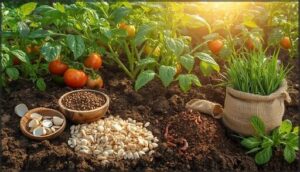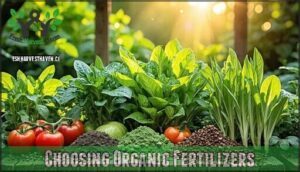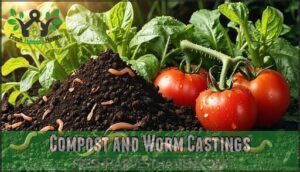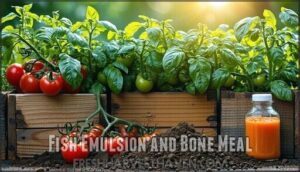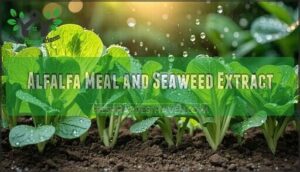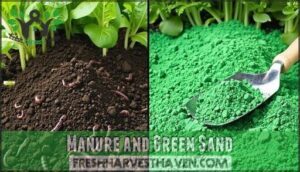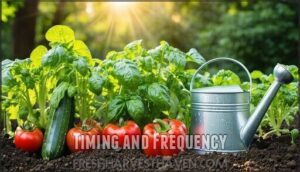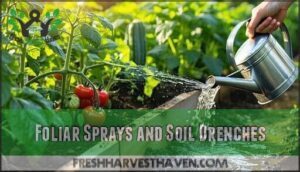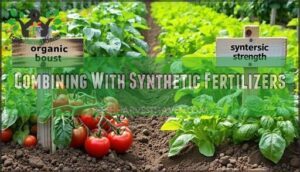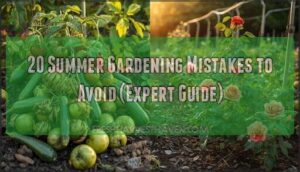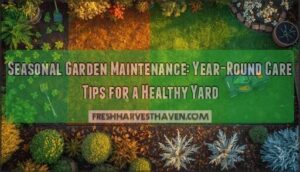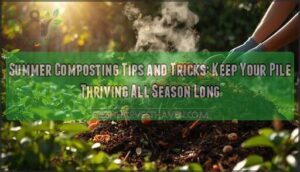This site is supported by our readers. We may earn a commission, at no cost to you, if you purchase through links.
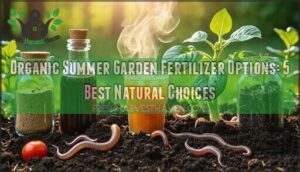
Fish emulsion delivers quick nitrogen for leafy growth, while compost tea provides slow-release nutrients and improves soil structure.
Seaweed extract offers micronutrients that help plants handle heat stress.
For flowering vegetables, bone meal supplies phosphorus for stronger blooms and fruit development, and worm castings work like nature’s multivitamin, feeding plants gently without burning roots.
These organic choices build soil health over time, unlike synthetic fertilizers that can create dependency, and the secret lies in understanding which combinations work best for different summer crops and timing applications correctly, using natural methods.
Table Of Contents
- Key Takeaways
- Organic Fertilizer Benefits
- Choosing Organic Fertilizers
- Types of Organic Fertilizers
- Applying Organic Fertilizers
- Summer Garden Fertilizer Options
- Frequently Asked Questions (FAQs)
- What fertilizer is best for organic gardening?
- What is the best organic fertilizer for tomatoes and peppers?
- How do I organically fertilize my vegetable garden?
- What is one reason not to use Miracle-Gro?
- Can organic fertilizers burn summer plants?
- How to store organic fertilizers properly?
- What signs indicate over-fertilization in gardens?
- Do organic fertilizers attract unwanted pests?
- When should fertilizing stop before harvest?
- Conclusion
Key Takeaways
- You’ll get the best results by combining different organic fertilizers – fish emulsion for quick nitrogen, bone meal for phosphorus, and worm castings for gentle, steady nutrition that won’t burn your plants during hot weather.
- Your soil health improves dramatically with organic options, boosting microbial activity by 40-60% and increasing water retention by 20%, which builds a stronger foundation for future growing seasons.
- You can save money and increase yields by 10-20% with organic fertilizers since they create lasting soil improvements that compound each season, unlike synthetic fertilizers that create dependency.
- You’ll need to apply organic fertilizers every 4-6 weeks during peak growing season, timing applications for early morning to avoid heat stress and using proper methods like soil drenching for deep nutrition or foliar sprays for quick micronutrient uptake.
Organic Fertilizer Benefits
When you choose organic fertilizers for your summer garden, you’re getting nutrients that release slowly and improve your soil’s structure while supporting beneficial microorganisms.
Transform your summer garden naturally—organic fertilizers nourish plants, enrich soil, and create thriving ecosystems that last season after season.
These natural options reduce chemical runoff by 30% compared to synthetic fertilizers and can increase your crop yields by 10-20% while building long-term soil health, which also supports beneficial microorganisms in the soil.
Environmental Advantages
Choosing organic garden fertilizer for your summer garden brings significant environmental wins.
These natural options support carbon sequestration by storing atmospheric carbon in soil.
You’ll reduce chemical runoff that pollutes waterways while supporting biodiversity through healthier ecosystems.
Organic fertilizers promote emission reduction compared to synthetic alternatives, creating sustainable gardening practices that protect ecosystem health for future generations.
Economic Benefits
Your wallet will thank you when you switch to organic garden fertilizer for your summer vegetables.
These natural options deliver impressive long-term savings while boosting your garden’s market value through increased yields.
- Reduced expenses – Homemade compost cuts fertilizer costs by 70%
- Carbon sequestration rewards from eco-friendly practices
- Higher crop yields mean more vegetables per dollar invested
Organic fertilizers for vegetables prove that going green saves green.
Studies show that organic methods reduce pollution.
Improved Soil Health
Organic summer garden fertilizer transforms your soil from the ground up.
Organic fertilizers don’t just feed your plants—they rebuild your garden’s foundation from the roots up.
These natural amendments boost microbial activity by 40-60%, creating a thriving underground ecosystem.
Compost and other organic fertilizers improve soil structure and aeration benefits while increasing water retention by 20%.
Enhanced nutrient availability feeds soil microbes, building the foundation for healthier plants and stronger root systems.
Increased Crop Yields
With proper nutrient optimization, your vegetables can produce 10-20% higher yields than synthetic alternatives.
Organic vegetable fertilizer creates lasting soil improvements that compound each season, while organic tomato fertilizer specifically boosts fruit production.
It does this through:
- Enhanced root development from phosphorus-rich bone meal
- Improved water retention reducing irrigation needs
- Natural pest control through strengthened plant immunity
Choosing Organic Fertilizers
When you’re selecting organic fertilizers for your summer garden, you’ll need to examine three essential factors: nutrient content, release time, and certification standards.
Understanding these elements helps you match the right fertilizer to your plants’ specific needs while ensuring you’re getting genuine organic products that won’t harm your soil or the environment, following certification standards.
Nutrient Content
Understanding NPK ratios helps you match fertilizer nutrient content to your plants’ specific needs.
Most organic options provide gentler nitrogen, phosphorus, and potassium levels than synthetic alternatives.
Check for essential micronutrients like calcium and magnesium too.
Soil testing reveals existing nutrient levels, while watching for deficiency symptoms guides your selections for ideal nutrient timing throughout summer to ensure the best plant growth.
Release Time and Soil Compatibility
Release time determines when nutrients become available to your plants.
Slow-release fertilizers provide steady nutrition over 8-12 weeks, while quick-release options deliver immediate results.
Soil compatibility matters because different organic fertilizers work better in specific pH ranges.
Decomposition rates vary based on soil temperature and microbial activity.
Match fertilizer longevity with your application frequency for ideal nutrient availability.
Certification and Organic Standards
When shopping for organic fertilizers, certification marks serve as your roadmap to genuine products.
Look for these key indicators that guarantee quality and authenticity:
- OMRI Listed – Approved for organic use
- NOP Standards – USDA organic compliance
- Third-Party Certification – Independent verification
- Biodynamic Certification – Holistic farming methods
- Clear Labeling Requirements – Transparent ingredient disclosure
Types of Organic Fertilizers
You’ll find organic fertilizers come in several distinct categories, each offering unique nutrient profiles and soil benefits for your summer garden.
These natural options include compost-based materials like worm castings, protein-rich sources such as fish emulsion and bone meal, plant-derived meals like alfalfa, mineral-rich seaweed extracts, and traditional aged manures that provide balanced nutrition.
They offer a range of benefits, but the text only mentions the types of organic fertilizers, including traditional aged manures.
Compost and Worm Castings
Compost and worm castings form the backbone of successful organic fertilizers for your summer garden.
These soil amendments improve structure while delivering steady nutrients. Composting methods transform kitchen scraps into garden gold, while vermicomposting techniques produce nutrient-rich castings.
You’ll find compost tea offers quick absorption, and both options boost soil health naturally without chemical burn risks.
Many gardeners find compost fertilizer products improve their yields, using natural and steady methods to enhance their garden’s performance.
Fish Emulsion and Bone Meal
Fish emulsion and bone meal offer powerful nutrition for your summer garden.
Fish emulsion delivers quick nitrogen with a 5-1-1 ratio, while bone meal provides slow-release phosphorus for strong roots.
These organic fertilizers work differently but complement each other perfectly. Fish meal can also be used to improve soil structure.
- Fish emulsion absorbs within 24-48 hours for rapid growth
- Bone meal supports flowering and fruiting over months
- Application methods include foliar sprays and soil drenches
- Sourcing sustainably guarantees quality organic gardening results
- Storage guidelines require cool, dry conditions for effectiveness
Alfalfa Meal and Seaweed Extract
Alfalfa meal delivers 2.5% nitrogen plus growth hormones that boost summer vegetables naturally.
You’ll get slow-release nutrition for 8-12 weeks with improved soil structure.
Seaweed extract provides 60+ trace minerals through foliar sprays every 2-3 weeks.
These organic fertilizers work together—alfalfa feeds soil microbes while seaweed minerals enhance plant stress resistance during hot weather.
Consider using beneficial microorganisms to aid in nutrient uptake.
Manure and Green Sand
Beyond traditional fertilizers, manure and greensand offer powerful soil amendments for your summer garden.
Composted manure from chicken or cow sources provides balanced nutrients while improving soil structure.
Greensand delivers slow-release potassium and trace minerals essential for plant health.
These natural sourcing options require careful application methods to maximize their soil amendment benefits without overwhelming your plants, using complete concepts to guide the process.
Applying Organic Fertilizers
Proper application techniques determine whether your organic fertilizers will effectively nourish your plants or waste valuable nutrients in your summer garden.
You’ll achieve the best results by understanding timing, frequency, and application methods that maximize nutrient absorption while preventing plant damage. Complete concepts of application determine whether your organic fertilizers will effectively nourish your plants.
Timing and Frequency
Perfect timing makes all the difference with summer garden fertilizer success.
Apply organic fertilizers every 4-6 weeks during peak growing season, adjusting application intervals based on growth stages and weather influence.
Early morning applications work best before heat stress kicks in.
Regular soil testing helps you nail seasonal application timing, ensuring your slow-release fertilizer feeds vegetables when they’re hungriest for nutrients.
Methods of Application
Successfully applying organic fertilizers requires choosing the right method for your garden’s needs.
Different application techniques deliver nutrients where plants need them most, ensuring ideal growth throughout summer.
- Broadcasting Methods: Spread granular fertilizers evenly across large garden areas before watering thoroughly
- Banding Application: Place fertilizer in narrow strips alongside plant rows for targeted nutrition
- Side Dressing: Apply compost or aged manure around established plants during growing season
- Top Dressing: Sprinkle slow-release organic fertilizers on soil surface around plant bases.
Consider equipment for fertilizer placement to optimize this method.
Foliar Sprays and Soil Drenches
When choosing between foliar application and soil drench methods, you’ll want to match your technique to your plants’ immediate needs.
Foliar sprays deliver micronutrients directly through leaves within 24 hours, while soil drenches provide deeper root stimulation over weeks.
One example of a good soil drench is fish scraps fertilizer, which provides phosphorus for flowering plants.
| Method | Best Timing | Application Rates | Nutrient Absorption |
|---|---|---|---|
| Foliar Spray | Early morning/evening | 1-2 tbsp per gallon | Immediate (24 hours) |
| Soil Drench | Anytime (avoid midday) | 2-4 tbsp per gallon | Gradual (2-4 weeks) |
| Seaweed Extract | Weekly foliar spray | Follow label directions | Fast micronutrient uptake |
| Liquid Fish Fertilizer | Bi-weekly drench frequency | Dilute 1:10 ratio | Sustained root feeding |
Combining With Synthetic Fertilizers
Why not harness the best of both worlds? Hybrid fertilization creates nutrient synergy by combining organic fertilizers with synthetic options for your summer garden.
This balanced approach delivers optimized growth while maintaining soil health and reducing runoff risks.
- Save money – Cut fertilizer costs by 30% through strategic combinations
- Boost yields – Increase plant nutrients availability by 20-35% over single-source methods
- Protect environment – Minimize chemical dependency while maximizing garden performance
Summer Garden Fertilizer Options
Summer gardens require specific organic fertilizers that can handle hot temperatures while providing sustained nutrition for your plants.
You’ll find five proven organic options that deliver essential nutrients without burning your crops during the growing season’s most demanding months.
1. Burpee Organic Blood Meal Fertilizer
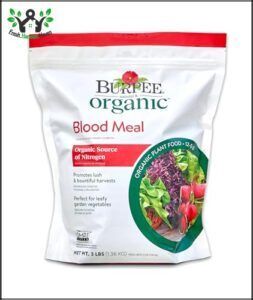
Burpee’s blood meal fertilizer delivers a powerful 12-0-0 Blood Meal NPK ratio, making it your summer garden’s nitrogen powerhouse.
This OMRI-certified organic fertilizer transforms leafy vegetables like kale and lettuce while boosting fruiting plants.
Application Best Practices include side-dressing heavy feeders and mixing with potting soil.
You’ll see remarkable Plant Growth Boost results while supporting Sustainable Gardening practices and enhanced Soil Health Impact.
2. Wiggle Worm Organic Worm Castings Fertilizer
Pure earthworm castings deliver incredible worm castings benefits for your summer garden without the mess.
You’ll apply just half a cup three times yearly above root zones for ideal soil improvement and plant health.
These odorless, football-shaped particles boost water retention while supporting sustainable gardening practices.
The thirty-pound bag offers exceptional value for organic gardeners seeking natural soil health solutions.
3. Organic Fish Emulsion Plant Fertilizer
Fish emulsion delivers a gentle nutrient boost your summer vegetables crave. This liquid gold transforms from ocean waste into garden treasure, offering a Fish Emulsion NPK ratio of 2-3-1 that won’t burn delicate plants.
Alternatively, you can explore fish fertilizer preparation using fish scraps for phosphorus.
- Quick Release formula feeds plants within 24 hours
- Perfect fertilizer for vegetables during hot summer months
- Application Techniques include foliar spraying and soil drenching
- Odor Control improves as fishy smell dissipates quickly
- Promotes steady plant growth throughout growing season
4. Dr Earth All Purpose Plant Food
Dr. Earth All Purpose Plant Food delivers balanced nutrition with its 4-6-5 NPK ratio, making it perfect for your summer garden’s diverse needs.
This handcrafted organic fertilizer excels in soil compatibility across various plant types, from vegetables to flowers.
You’ll appreciate its gentle formula that won’t burn plants while providing cost-effective natural plant food that supports robust soil health and sustainable organic gardening practices.
5. Down to Earth Alfalfa Meal Fertilizer
Down to Earth Alfalfa Meal stands out among organic fertilizers with its gentle 2-0-1 formula and slow-release properties.
This soil amendment enriches your garden with trace minerals, amino acids, and natural plant hormones.
You’ll appreciate its dual role as both fertilizer and compost activator.
Mix it into soil before planting or top-dress established plants without risking nutrient burn.
Frequently Asked Questions (FAQs)
What fertilizer is best for organic gardening?
Organic fertilizers increase soil microbial activity by 40-60% compared to synthetic options. You’ll find compost, worm castings, and fish emulsion work best for consistent growth while improving soil structure naturally.
What is the best organic fertilizer for tomatoes and peppers?
For tomatoes and peppers, you’ll want bone meal for strong root development and fish emulsion for steady nitrogen.
Apply every two weeks during growing season for robust plants and abundant harvests.
How do I organically fertilize my vegetable garden?
Start with compost as your foundation, then apply fish emulsion every two weeks during growing season.
Add bone meal for root development and worm castings for steady nutrition.
Water thoroughly after each application.
What is one reason not to use Miracle-Gro?
Miracle-Gro contains synthetic chemicals that can burn your plants if you’re not careful with application rates.
It also doesn’t improve soil health like organic fertilizers do, leaving your garden dependent on repeated chemical applications.
Can organic fertilizers burn summer plants?
Surprisingly, organic fertilizers rarely burn plants since they release nutrients slowly.
You’d need to drastically over-apply compost or fish emulsion to cause damage, unlike synthetic fertilizers that can easily scorch delicate summer foliage, making synthetic fertilizers more hazardous.
How to store organic fertilizers properly?
Store organic fertilizers in cool, dry places away from direct sunlight.
Keep granular types in sealed containers to prevent moisture absorption.
Liquid fertilizers need frost protection and should stay in original containers with tight lids to ensure complete safety.
What signs indicate over-fertilization in gardens?
Like a kid’s sugar rush leading to a crash, over-fertilized plants show excessive green growth, yellowing leaves, stunted roots, and increased pest problems.
You’ll notice weak stems that can’t support lush foliage growth.
Do organic fertilizers attract unwanted pests?
Organic fertilizers don’t typically attract pests when applied correctly.
However, fresh manure, fish emulsion, and compost can draw flies, rodents, or other creatures if you’re not careful with timing and application methods, which can lead to attracting pests.
When should fertilizing stop before harvest?
Fresh harvest versus lingering chemicals – timing matters.
Stop fertilizing your vegetables 2-4 weeks before harvest.
Leafy greens need shorter gaps, while tomatoes and peppers require longer breaks for superior flavor.
Conclusion
Choosing the right organic summer garden fertilizer options doesn’t require a crystal ball to predict success.
You’ll find that fish emulsion, compost tea, seaweed extract, bone meal, and worm castings each serve specific purposes in your garden’s ecosystem.
These natural fertilizers work together to build lasting soil health while providing essential nutrients your plants need during hot summer months.
Start with one or two options, observe your plants’ responses, and adjust your feeding schedule accordingly for ideal results.

